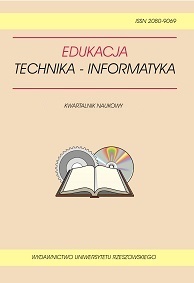The level of students technical knowledge – survey results
DOI:
https://doi.org/10.15584/eti.2016.2.12Słowa kluczowe:
technical education, evaluation, the level of knowledgeAbstrakt
The necessity of the universal technical education of the youth, understood as providing them with the basis for technical culture, is a consequence of a widespread and still growing importance of technology in all domains of contemporary life. In the face of modern technical culture requirements, present day education cannot be limited to acquiring manual skills. It should at the same time ensure gaining basic technical knowledge and developing technical thinking and interests [Depešová 2011: 51–57; Piecuch 2008]. Children and teenagers should be prepared to receive and apply technical knowledge in everyday life. The grounds for that are laid by school, but it should be accompanied by other cultural and educational institutions, and by family [Depešová, Knych, Noga 2014: 59–64; Furmanek 2006: 33–48; Hrmo, Kundratowa, Tinakova 2005]. Forming children’s and teenagers’ technical interests is a matter of the utmost importance. Hence the necessity to coordinate the efforts of all educators in order to encourage students to acquire knowledge independently and to take an active part in an educational process organised by school. Such a process requires from students the practical usage of mental work methods. The knowledge about technology should systematically be updated because of a dynamic scientific and technical development or due to new technologies. This study shows selected survey results of students’ technical knowledge on three different educational stages in Poland [Hašková, Pisoňová, Bitterová 2011; Kozík, Depešová 2007; Nazar 1973].Pobrania
Opublikowane
2016-06-30
Jak cytować
NOGA, H., DEPEŠOVÁ, J., NESTERAK, T., & KUČERKA, D. (2016). The level of students technical knowledge – survey results. Journal of Education, Technology and Computer Science, 16(2), 99–107. https://doi.org/10.15584/eti.2016.2.12
Numer
Dział
PROBLEMY EDUKACJI TECHNICZNEJ I ZAWODOWEJ
Licencja
Prawa autorskie (c) 2016 Journal of Education, Technology and Computer Science

Utwór dostępny jest na licencji Creative Commons Uznanie autorstwa – Na tych samych warunkach 4.0 Miedzynarodowe.

